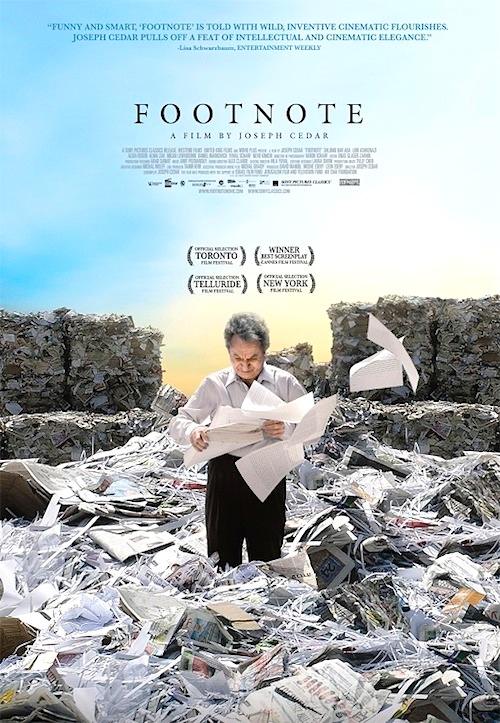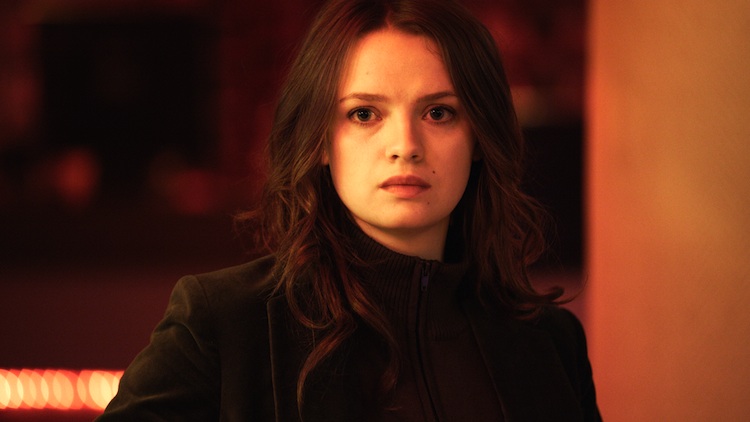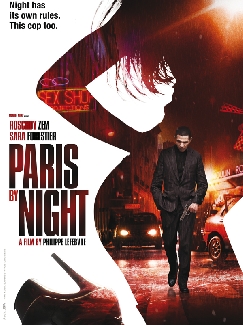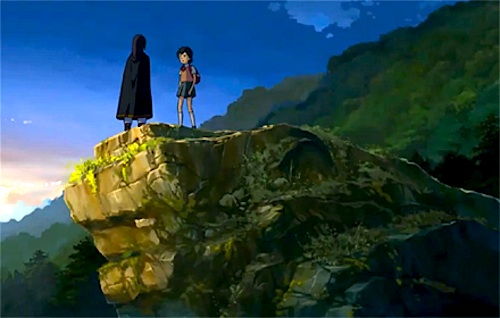By Joe Bendel. Eliezer Shkolnik might not look like a national treasure. According to his colleagues, the standoffish Talmudic scholar has a rather thin resume of accomplishments. Yet Shkolnik is about to learn that he will be awarded the Israel Prize, the country’s highest honor for scholarship. However, the circumstances surrounding his belated recognition are rather complicated in Joseph Cedar’s Oscar nominated Footnote, which opens this Friday in New York.
As Footnote commences, the senior Shkolnik must squirm in ill-concealed discomfort as his son Uriel receives another honor long denied to him. Eliezer Shkolnik is openly contemptuous of his son’s trendy work. He might regard it as rubbish, but Uriel Shkolnik publishes an awful lot of it. The same cannot be said of the father, whose life’s project was undermined by archaeological discoveries and the manipulations of a bitter academic rival. Every year, the elder Shkolnik is nominated for the Israel Prize – but to no avail, until now.
 Unfortunately, Uriel Shkolnik has an awkward truth dumped on him by the Prize committee, including his father’s lifelong nemesis. That call was meant for him, not his father. Convinced the public humiliation would destroy what is left of his father’s psyche, the younger Shkolnik desperately negotiates to maintain the honors list as is, just as his father begins to vent his opinions about Uriel’s brand of scholarship in the media.
Unfortunately, Uriel Shkolnik has an awkward truth dumped on him by the Prize committee, including his father’s lifelong nemesis. That call was meant for him, not his father. Convinced the public humiliation would destroy what is left of his father’s psyche, the younger Shkolnik desperately negotiates to maintain the honors list as is, just as his father begins to vent his opinions about Uriel’s brand of scholarship in the media.
Though there is no violence on-screen, Cedar’s razor-sharp screenplay draws real blood. All the pettiness and jealousy of academia is on full display throughout Footnote, while the father-son contentions take on the dimensions of classical tragedy. Indeed, their research might only be of interest to a rarified circle of scholars, but they fight over it like a strategic hill on a blood-soaked battlefield.
Lior Ashkenazi (an Israeli Film Academy Award winner, whose credits include Israel’s first slasher film, Rabies) convincingly portrays the conflicted son, while Shlomo Bar Aba is maddeningly but effectively inscrutable as the reserved and rather squirrely father. Yet Israeli theater director Micah Lewesohn really makes it all crackle and spark as the senior (and eventually junior) Shkolnik’s foil, the Moriarty-like Prof. Yehuda Grossman.
Visually, Footnote is surprisingly dynamic, especially given the esoteric concerns of its characters. Cedar employs montages, sly captions, and rapid edits for shrewd comedic effect, in ways that support rather than overwhelm the central drama. Indeed, cinematographer Yaron Scharf and editor Einat Glaser-Zarhin were clearly key collaborators in stylishly rendering Footnote’s sophisticated look and acerbic vibe.
Part of a very strong field of foreign language Oscar nominees this year, Footnote was a worthy contender. Ironically, despite facing criticism from Islamist hardliners, the state media has trumpeted Asghar Farhadi’s Academy Award for A Separation as an Iranian triumph over Israel, cheapening his moment on the world stage as a result. In fact, while in no way a political film per se, the constant security checks Cedar’s characters go through serve as a grim reminder of the homicidal hatred average Israelis must defy just by going about their everyday lives. Intelligently written and executed, Footnote is highly recommended when it opens this Friday (3/9) in New York at the Angelika Film Center.
LFM GRADE: A
Posted on March 6th, 2012 at 4:31pm.



